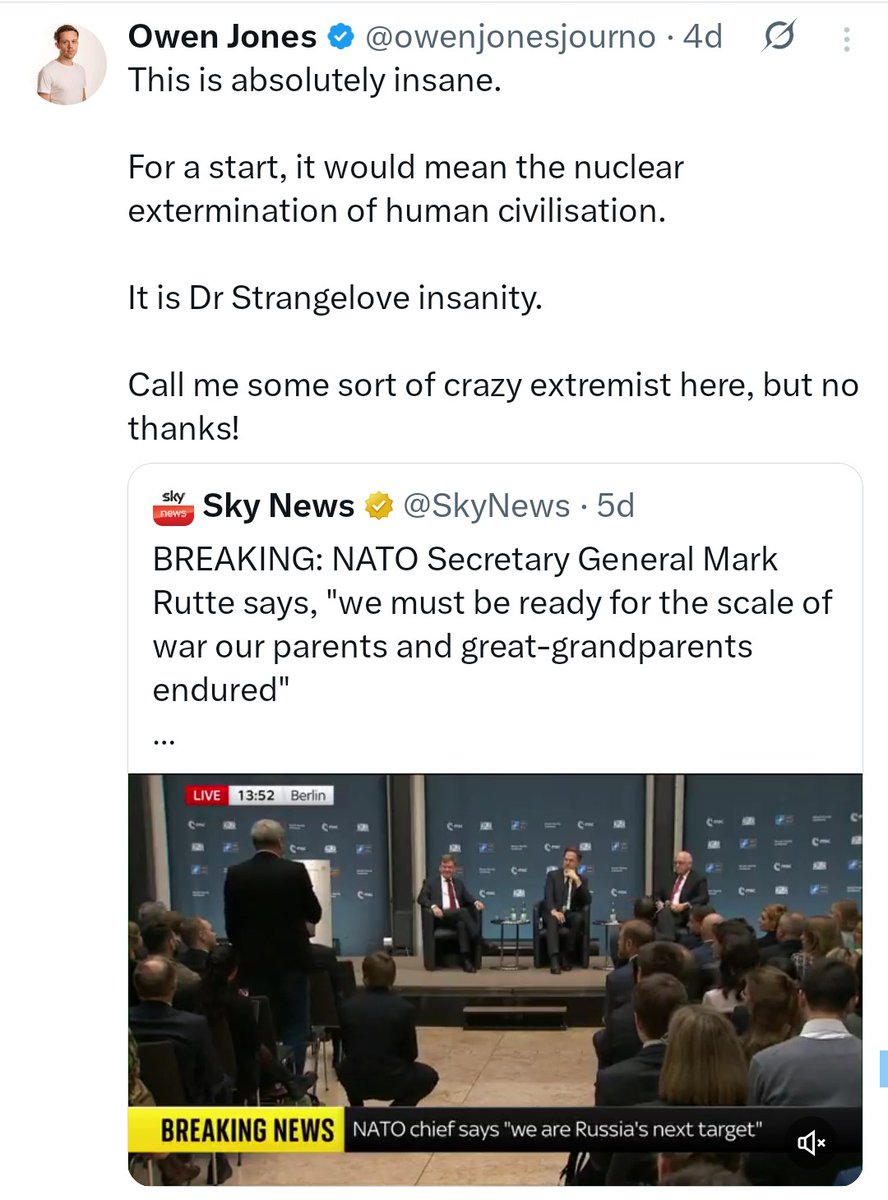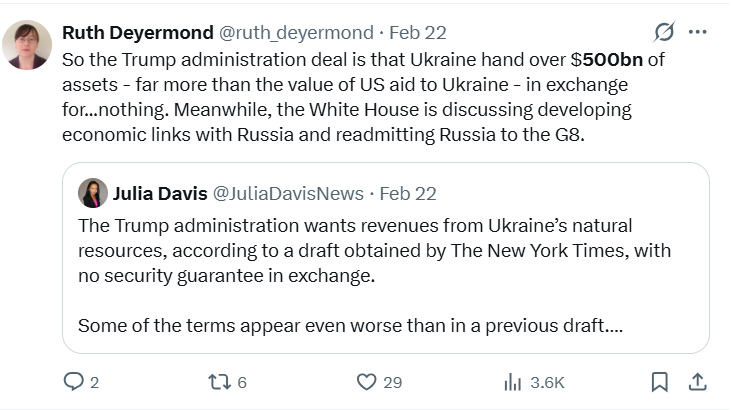Since it’s that time of year again, 12 end-of-year and start-of-new-year thoughts about Russia’s war against Ukraine and its implications. A long 🧵
1. Russia can’t win. In recent months, there’s been a lot of discussion in the West about Russian victory, but the Russian govt’s objectives were unrealistic from the start, and impossible to achieve almost as soon as the fighting started.
The explicit aims of the invasion were: reset the strategic map of Europe in Russia’s favour; stop “genocide” in Eastern Ukraine; create a pro-Russian Ukraine, including a puppet govt in Kyiv (i.e. “denazify” Ukraine).
Other aims were the strengthening of Russian dominance in the states formerly part of the USSR and strengthening Russia’s global great power status.
Instead of achieving these goals, Russia’s invasion of Ukraine has expanded NATO and hugely increased NATO and EU accession prospects for Ukraine and Moldova.
The govt in Kyiv has never looked less likely to become pro-Russian, and Ukraine has never looked more likely to be politically and normatively integrated into what we might call a common European home (minus Russia and Belarus).
Rather than stop a genocide that wasn’t happening, Russian forces have raped, tortured, and killed many thousands of the people they claimed to be protecting. 

Rather than strengthen its regional dominance, Russia’s war against Ukraine has weakened its position in it’s so-called “near abroad”.
Instead of reinforcing its claims to great power identity, the war has rapidly increased dependence on China. Economically and diplomatically, Russia looks less like a partner of China and more like a client state. Measured against all its war aims, Russia has lost, and can't win
2. But Ukraine can still lose. The fact Russia can’t win on its original terms means Putin – whose presidency is now tied to the war - is having to find new aims Russia *can* achieve and can present as a victory.
To do this, Russia will continue to kill Ukrainians and destroy the Ukrainian economy, Ukrainian infrastructure, cultural sites, and the environment. Ukraine could – and without continued meaningful Western support, will – lose more territory.
3. The West can also lose. If Russia can convince itself and others that it is winning in Ukraine, the West – both collectively and individual states, above all the US – will look, and therefore be, weaker.
Anything but Russian defeat in Ukraine will have acute security implications for NATO members in all sorts of areas, from the security of the Black Sea to the integrity of domestic democratic processes.
4. One reason for that is that the Russian govt has decided the West (the US, NATO, the EU) is not just an enemy, it's *the* enemy. That’s now baked in both to the conduct of and external justification for the war, and its domestic rationale inside Russia.
Whether states like France or Germany want to be Russia’s enemy is irrelevant. As long as the Russian govt has existential reasons to frame the West as the enemy, there’s nothing the West can do about it except decide whether to resist or capitulate to Russian aggression.
5. Western govts therefore need to recognize that European security is a priority again, and that comes with a significant financial cost, including for those NATO members that have engaged in free riding for decades.
The alternative (trying to force Ukraine into a settlement so Europe can go back to business as usual) will only defer and increase costs, because Russia has defined itself against an enemy West. Western govts need to communicate this to their citizens, however unpalatable it is.
6. Western govts and media need to recognize that this is a major war and that major wars are long and complex and expensive. There will always be defeats as well as victories.
These things are inconvenient for electoral and modern news cycles, but successful outcomes depend on recognizing them and explaining them clearly to people who understandably want the war to be over.
7. The capacity to determine the outcome of the war - a pivotal moment for European security and global stability - rests with the West: both the US and Europe.
The Russian govt understands this, which is why it’s working to undermine Western commitment and cohesion. The West needs to understand it, too, and develop a coherent, common strategy for combatting that interference.
8. Russia and the US will both have presidential elections in 2024. Only one of these will matter.
The election of Trump, or another candidate who shares his dislike of NATO and his admiration for Putin and other autocrats, would be the most destabilizing international event for decades. It would make a wider war in Europe more likely and would further weaken the US itself.
American political elites, analysts, and voters with any concern about the security of their country, their allies, and the international stability on which the US depends, need to shake off the late-1930s-France-style fatalism visible in many people who should know better.
9. There’s no chance of negotiations that will end the war. Anyone in the West who thinks there is, doesn’t understand very much about the Russian govt (and needs to go and read @samagreene) or its 30 year use of negotiations and frozen conflicts.
https://twitter.com/ruth_deyermond/status/1720538221757493349
@samagreene 10. Western states need to recognize that paying attention to Russia isn’t a distraction from China – the two challenges are now connected.
Before 2022, even after 2014, foreign policy elites in the US and elsewhere in the West too often treated paying attention to Russia as a temporary diversion from more serious business. The temptation to return to that mindset needs to be challenged robustly.
11. The West needs to recognize that Putin won’t last forever so they need to start planning now for a post-Putin Russia: what it means for Western security and international stability, and how they respond to it.
The Russian media claim that Western govts want to bring down Putin; in fact, there's deep anxiety about what will happen if Putin goes. Significant sections of Western political elites seem to see Putin as the least worst option and worry about the effects of destabilizing him.
This is short-sighted. Putin's 71, he’s not going to be president, except maybe as a figurehead, for very many more years. If he’s lucky, he could probably expect one more election victory after 2024. A post-Putin Russia is coming sooner than many in the West acknowledge or want.
12. Most importantly – because everything else depends on it - the West needs to decide what winning in Ukraine looks like. This has become a cliché of Western analysis and discussion, but for the very good reason that it’s correct.
Since 2014, the US and its European partners have fudged the issue of how Russian aggression against Ukraine is finally resolved. That’s not a viable option any more (not that it ever was).
Do Washington, Paris, Berlin, and other capitals think victory in Ukraine is a return to pre-2022 borders, pre-2014 borders, or the complete expulsion of Russian military forces from Ukrainian territory (something that has never happened in the 32 years since the USSR dissolved)?
They need to decide now, because the future of Ukraine, Europe, and NATO all depend on it.
All of these things involve making unpleasant choices and, just as importantly, communicating difficult messages to electorates. But pretending they are easier or less painful will only make future costs higher and US and European security more fragile.
• • •
Missing some Tweet in this thread? You can try to
force a refresh










